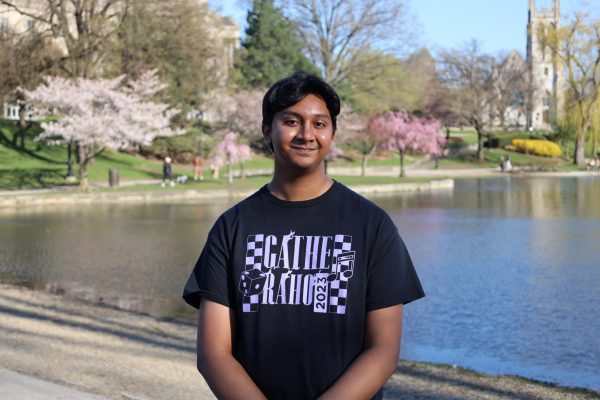A Korean man, a Korean woman and a white man are seen together at a dimly lit bar on a quiet New York City evening. Two other people, though unseen, are heard speaking about the trio, wondering what their story is. They each quibble over whether the woman is in a relationship with one man or the other, whether the visibly Asian pair are siblings, whether they’re in town as tourists with a guide or simply as colleagues. It’s a droll set of dialogue that plays out while the camera gradually zooms in on the woman at the center: a woman that, though unremarkable at first glance, has a wealth of memories and feelings that have gone unresolved for a long time.
That scene depicts the beauty of life’s normalcy that is present throughout Celine Song’s directorial debut, “Past Lives.” The film, a semi-autobiographical feature written by Song herself, is nominated for two Academy Awards this year, one for Best Picture and the other for Best Original Screenplay. But upon watching the film and examining its ins and outs, it leaves a bitter taste in my mouth seeing the Academy declare that’s all it deserves.
“Past Lives” follows the 24-year long story of two childhood friends and potential sweethearts, Na Young (Greta Lee) and Hae Sung (Teo Yoo), who abruptly part ways after the former moves to Canada. The pair find each other again online after 12 years, with Na Young, who goes by her anglicized name Nora, aspiring to become a playwright, while Hae Sung completes his military service and returns to university to study engineering. Numerous Skype calls take place in the latest hours of the evening and the earliest of the morning, until Nora decides to cut off contact so that she can focus on her career.
Fast forward 12 years, and Nora is a successful playwright living in NYC with her Jewish-American husband Arthur (John Magaro). He’s a goofy, yet passionate, fellow writer who met Nora at a rural retreat. Meanwhile, Hae Sung plans a trip to the city following a recent separation from his girlfriend, intending to see Nora under the pretense of sightseeing. In the short time they have together, Nora and Hae Sung catch up and visit various spots together before having dinner with Arthur, while simultaneously contemplating the nature of their relationship after so many years. The recurring concept of “inyeon” is brought up, which refers to one’s fateful connection with another over the course of their life as a result of their relationship in a previous life. Through “inyeon,” the trio ponders the possibilities of a different path, albeit with some uncertainty.
In the midst of watching these characters’ identities unfold, it becomes difficult to not dote on them. Lee portrays Nora’s uncertainty with a sense of odd familiarity that makes you empathize with her. She gives Nora a sense of resilience that you can feel in her speech and facial expressions as she code-switches between Hae Sung and Arthur, up until the last moment when she sees the former off to his car. This is even more impressive given Lee’s low expectations about taking on a role with so much non-English dialogue, which she found challenging considering it’s already difficult to act in English.
Yoo’s Hae Sung, an idealistic man with his heart on his sleeve in the face of repeated disappointment, makes your heart melt. It’s natural to empathize with a man whose favorite person is now an entire ocean away. Magaro also gives quite the underrated performance as Arthur, whose cultural barriers keep him from getting to know Na Young and not just Nora. Yet even through that doubt and awkwardness stemming from Hae Sung’s visit and third-wheel presence during their night out together, Arthur possesses an understanding that transcends any level of Korean fluency.
“Past Lives” is a story that isn’t just unique to the immigrant experience, but is undoubtedly poignant because it comes from the lens of an immigrant. Free of melodrama and shock twists, the film carefully explores the enigma of lost love, childhood memories and alternative realities and learning about what it is that keeps them alive and people tethered to them. As much as one wishes to think about what might have been, one can only help but keep the past in its rightful place—until the next life comes to seek you out again.



